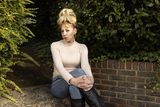‘Raised by the Village’ review: Feel-good television that steers clear of asking deeper questions
Raised by the Village (RTÉ) : 3/5
Dublin teen Alex (centre) spent five days with the Hayes family at their dairy farm in Clare. Photo: RTÉ
The second episode of Raised by the Village (RTÉ1, Sunday, March 31) opens, as they all do, with the lofty claim that the series is “a unique social experiment”.
Unique? Hardly. Television has for years been yanking troubled and/or troublesome teenagers out of their comfort zones, usually urban, and dropping them into unfamiliar environments, usually rural, in the hope it will have a transformative effect on their lives.
The first four-part season of Raised by the Village was broadcast five years ago (the Covid-19 pandemic presumably played a part in the long wait for the second). A decade earlier, RTÉ gave us two seasons of Teens in the Wild, fronted by clinical psychologist David Coleman.
Calling Raised by the Village – which takes its title from the old proverb “It takes a village to raise a child – a social experiment (they once said that about Big Brother) is also a bit of a reach.
It’s a reality show, albeit a very well-made one, that’s been shaped in the editing suite for maximum emotional impact and entertainment value.
But, as with all shows of its kind, it’s like putting a Band-Aid plaster on a head wound that’s bleeding profusely. The bigger societal ills – poverty, government neglect, a history of bad urban planning, educational inequality, lack of social amenities, the demonising of working-class communities – that put a drag on many young people’s potential are touched on only lightly, if at all.
Once the kids in Raised by the Village return to their own homes after their five-day sojourn down the country and the door closes behind them, it closes on their stories, too.
What happened after the production crew folded up their tent and left? Did the lessons the kids apparently learn during their break away from their normal environment stick? Did their lives change in a meaningful way?
We never find out because the series isn’t interested in finding out. Once you accept the limitations of what Raised by the Village is, rather than what it claims to be, it makes for a warm-hearted, but ultimately inconsequential, hour.
The two Dublin teenagers getting their first taste of life beyond the big smoke are 16-year-old Calum from Jobstown in Tallaght and 15-year-old Alex from Balbriggan.
Calum, who lives with his grandmother Suzanne, dropped out of school. He stays up all night playing video games and tooling around on his phone, and then stays in bed til late afternoon.
He got in trouble with the gardaí three years ago, but he refuses to touch drugs or get involved in crime (naively, he also seems to think drugs are exclusively a Dublin problem).
Calum doesn’t exactly make the best case for himself. “I’m really not arsed getting a job at the minute,” he says. “I wouldn’t work in McDonald’s, Dunnes, Tesco, nowhere. I just wouldn’t be able to listen to people complain.”
Alex is equally workshy. “She doesn’t do a tap,” says her mother Elaine. It’s not an assessment Alex disagrees with. “I don’t have the motivation to do work,” she says. Like Calum, she’s awake when she should sleeping, doing nothing more productive than TikTok-ing.
She’s been in trouble with the gardaí for public drunkenness and regularly mitches from school. Alex’s father died six years ago.
Elaine believes she’s “holding on to the grief”.
Calum was billeted with the Fitzgeralds, who own a suckler farm in New Inn, Tipperary. Alex went to stay with the Hayes family, who operate a large dairy farm with an attendant cafe and play centre in Tulla in Clare.
The episode follows a familiar pattern: the city kids’ initial resistance to country life, with its early starts, hard work and abundant cow shit, gradually melts away. Both of them get stuck in and prove far more capable than anyone, least of all they, could have imagined. They respond well to the boundaries lacking at home.
When the time comes to say goodbye, the emotion on both sides is genuine and touching.
“I didn’t want to leave,” says Calum as the car taking him back to Dublin pulls away.
You’re left with the feeling that what didn’t make the final cut might tell us more about these kids than what did.
But that might dim the feel-good glow.
Join the Irish Independent WhatsApp channel
Stay up to date with all the latest news










